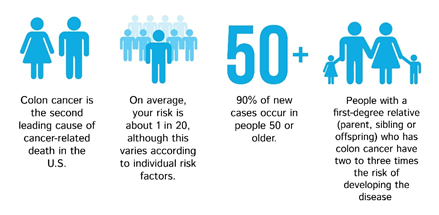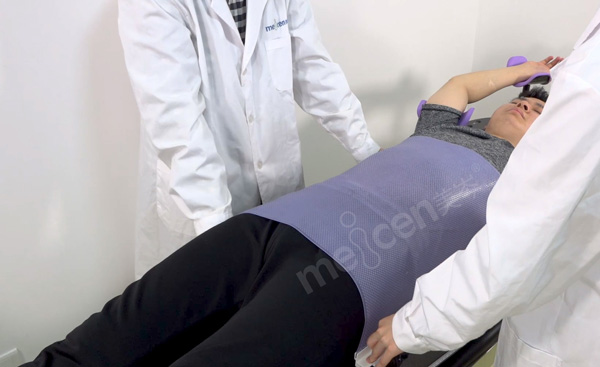Start Spreading : It’s Colorectal Cancer Awareness Month
March is Colorectal Cancer Awareness Month. According to cancer statistics worldwide 2020,colorectal cancer is one of the most common cancer diagnosed in both men and women in the world. The number of colorectal cancer new cases in the world for 2020 was 1,930,000.

Colorectal cancer occurs when abnormal cells form tumors in normal tissues of the intestines and digestive system. Your intestines are made up of two primary parts: the colon (large intestine) which measures between five and six feet long, beginning at the cecum and ending at the anus. The last five to 10 inches of the colon are known as the rectum. Cancer that affects the rectum is known as rectal cancer, while cancer in the remainder of the colon is colon cancer. The umbrella term for both types of cancers in those areas is colorectal cancer.
Colorectal cancer screening is highly effective in detecting and preventing colon and rectal cancers. Colorectal death rates have declined over the past 15 years, due to better detection and treatment.

“5 Things to Know” about symptoms, risk factors, prevention and screening for colorectal cancer, which develops in the large intestine, or colon (the lower part of the body’s digestive system):
1. All adults, beginning at age 50, should be screened for colorectal cancer, and a colonoscopy is the most effective method of detecting and preventing colon cancer. African Americans should begin screening at age 45, as they are at higher risk for colon cancer. In addition to African Americans, adults with a familial history of colorectal cancer, a genetic predisposition for the disease, and/or a history of inflammatory bowel or Crohn’s disease, are at higher risk for colorectal cancer and should be screened earlier.
While there are several colorectal screening options, including in-home stool testing or a CT colonography, a colonoscopy—a minimally invasive procedure that allows medical staff to view your entire large intestine—is the most common and effective modality for the detection of cancer, and the detection and removal of any precancerous cell growth, or polyps.
If no polyps or other irregularities are found, the procedure does not need to be repeated for another 10 years.
2. Colorectal cancer is rising among younger adults. Although more than 90% of colorectal cancers are diagnosed in patients over age 50, studies found a small, but alarming rise in colorectal cancer rates in adults ages 20 to 40.
3. It’s important to know the symptoms of colorectal cancer. colorectal cancer doesn’t always display symptoms right away, Adults, especially those with any risk factors, should be aware of the following symptoms for colorectal cancer:
- Diarrhea, constipation, or narrowing of the stool, lasting for more than three days
- Constant feeling of need to have a bowel movement, with no relief by having one
- Bright red rectal bleeding
- Blood in the stool, giving it a dark complexion
- Cramping or abdominal pain
- Weakness and fatigue
- Unintended weight loss
4. Diet and lifestyle choices can help prevent colorectal cancer.
Low-fiber, high-fat diet. Colon cancer and rectal cancer may be associated with a typical Western diet, which is low in fiber and high in fat and calories. Some studies have found an increased risk of colon cancer in people who eat diets high in red meat and processed meat.
In addition, obesity, smoking, heavy alcohol use, and physical inactivity also are risk factors for colorectal cancer. A sedentary lifestyle, people who are inactive are more likely to develop colon cancer. Getting regular physical activity may reduce your risk of colon cancer. People who are obese have an increased risk of colon cancer and an increased risk of dying of colon cancer when compared with people considered normal weight.
5. It’s easy to schedule a colonoscopy, and it’s never too late to have your first screening.
Between 2000 and 2014, death rates for colorectal cancer dropped 34% among patients 50 and older. By continuing to spread the word about the importance of risk factors, healthy lifestyle and regular screenings, we can bring the number of deaths closer to zero. With regular screenings as recommended by your doctor and simple lifestyle changes, you can lower your risk of colorectal cancer. If you or someone you know has a family history of colon, rectal, or other cancers, we encourage you to have your first screening as soon as possible.

A colonoscopy is an exam used to detect changes or abnormalities in the colon and rectum. Though a colonoscopy sounds as though it could be uncomfortable or hurt, it is actually painless. During the procedure, you’ll receive a sedating medication to make you more comfortable, and most people can return to their normal activities that same day. All in all, the hassle is worth it. Precancerous polyps can be removed during the procedure, which is much easier than treating late-stage colon cancer, which may involve surgery, radiation therapy, or chemotherapy.


